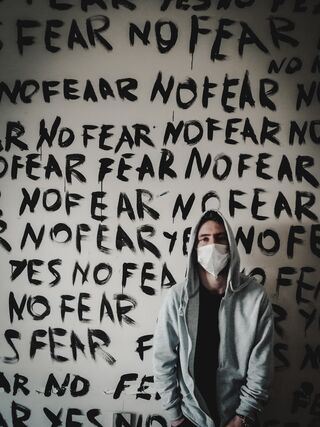Coronavirus Disease 2019
Will Femmephobia Increase COVID-19’s Death Toll?
New research says men are less willing to wear masks for fear of looking weak.
Posted June 27, 2020
This post was co-authored with Dr. Rhea Hoskin.
Femmephobia refers to the societal devaluation of femininity and all things deemed feminine. The term itself shows up most frequently within the LGBTQ+ community and is often used to refer to the rejection of more feminine members of the community, including feminine or femme lesbians and feminine gay men. But, according to Femme Theory scholars, femmephobia has much deeper roots and shows up well beyond the confines of the queer community. This prejudice runs so deep that it may even have an impact on how the world manages to survive the COVID-19 pandemic.
Men in Masks
The Washington Post recently published an article in which they stated, “Making men feel manly in masks is, unfortunately, a public health challenge of our time.” While public health officials have now widely advised people to adopt the habit of mask-wearing to protect themselves and others from the spread of COVID-19, many people are resisting this recommendation. Some people are refusing to wear masks because they feel their freedom is being infringed upon and that the government should not be able to dictate what they wear. And although it may anecdotally seem like women are the ones refusing to wear masks based on the number of viral videos on social media, research is finding that men are more reluctant to wear masks than women.
But why? Other research on COVID-19 strongly suggests that men are more susceptible to COVID-19 and the disease is more severe in men compared to women. Given this information, men should be first in line to wear masks and encourage others to do so as well. This would make logical sense if we didn’t live in a world so deeply steeped in femmephobia. We devalue femininity to such a great extent that some have called femmephobia a "naturalized" form of prejudice—we simply do not see it.
Want to encourage your football team to play harder? Call them ladies or girls—label them with the most devalued trait possible: femininity. Want to deride the politician you disagree with? Turn them into a meme that feminizes them, such as the memes that put makeup on Trump or Putin. Femmephobia is so pervasive within our society that the very same person can use it in one breath to strike a blow at Donald Trump and moments later turn that same sentiment against their fellow queers when they write “no fems” on their Grindr profile.

Thus, if wearing a mask to protect oneself and others from COVID-19 is perceived as feminine, it really shouldn’t be surprising that men are more likely to refuse to wear masks. One quality that sets femmephobia apart from other prejudices—such as transphobia or homophobia—is that it truly inflicts its consequences on not only its targets (feminine people and those perceived to have feminine characteristics), it also has the power to inflict significant consequences on the wielders of femmephobic sentiments. In this case, men who see masks as feminine are willing to put themselves, their loved ones, and all of their acquaintances at greater risk of illness and death from COVID-19 in order to avoid the mere possibility that others will see them as less masculine—and more feminine. Even among the men more willing to wear masks, I’ve seen some refuse to wear a mask that has the “wrong” pattern—anything that could be remotely associated with femininity is discarded and shunned.
Unfortunately, this isn’t all just conjecture. A recent study conducted by researchers at Middlesex University and Berkeley examined intentions to wear face masks in response to COVID-19 and compared those intentions across gender. Men in the study were less likely to indicate an intention to wear a mask and one of the reasons for that lack of intention was that they saw masks as being a “sign of weakness” and “shameful.” Dare we say—feminine?

The answer to this public health dilemma, as the Washington Post lays it out, is to make men believe that masks are manly. This strategy appears to be behind the recent hashtag #RealMenWearMasks that was launched by Dick Cheney to change the perception of mask-wearing from an apparent stigma of weakness to a sign of masculine strength. This isn’t the first time we’ve seen strategies like this. In fact, it seems that any time men don’t want to do something because that ‘something’ is perceived as “weak” (aka, feminine), an iteration of the “Real Men” campaign gets launched. Whether focused on depression, hygiene, or health care, these campaigns always focus on rebranding the feminine as an acceptable expression of masculinity and strength. Real men hug. Real men talk about their feelings. Real men wear pink. Real men ask for help. And now—real men wear masks.
It begs the question: What if we just revalued femininity instead? If femininity was valued on equal footing as masculinity, then whenever something new came along that was deemed feminine—such as wearing a mask to avoid catching and spreading a deadly virus—no rebrand would be needed. It would automatically be seen as an admirable trait, simply because being associated with femininity would be seen as desirable, a sign of strength, and inherently worthy of respect.
References
Hoskin, R. A. (2019). Femmephobia: The role of anti-femininity and gender policing in LGBTQ+ people’s experiences of discrimination. Sex Roles, 81(11-12), 686-703.
Hoskin, R. A. (2020). “Femininity? It’s the Aesthetic of Subordination”: Examining Femmephobia, the Gender Binary, and Experiences of Oppression Among Sexual and Gender Minorities. Archives of Sexual Behavior, 1-21.
Blair, K. L., & Hoskin, R. A. (2015). Experiences of femme identity: Coming out, invisibility and femmephobia. Psychology & Sexuality, 6(3), 229-244.
Miller, B., & Behm-Morawitz, E. (2016). “Masculine Guys Only”: The effects of femmephobic mobile dating application profiles on partner selection for men who have sex with men. Computers in Human Behavior, 62, 176-185.
Jin, J. M., Bai, P., He, W., Wu, F., Liu, X. F., Han, D. M., ... & Yang, J. K. (2020). Gender differences in patients with COVID-19: Focus on severity and mortality. Frontiers in Public Health, 8, 152.
Capraro, V., & Barcelo, H. (2020, May 11). The effect of messaging and gender on intentions to wear a face covering to slow down COVID-19 transmission. https://doi.org/10.31234/osf.io/tg7vz


